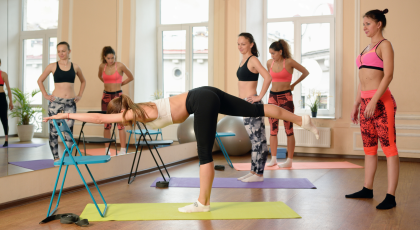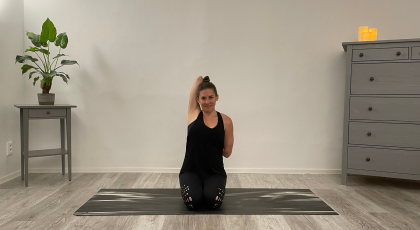View basket (0 items $0.00)

Yoga Enhances Mood and Well-being for MS Patients Study Shows
As yoga instructors, we have often seen a student’s peaceful smile after practice, but to experience the exhilaration felt by my Yoga Moves MS students is truly inspiring.
Research Shows Benefits of Yoga for Multiple Sclerosis
It is no wonder that two recent studies on yoga and multiple sclerosis (MS) confirm that yoga uplifts one’s mood (1, 2). Individuals with MS experience a wide range of psychological symptoms, including anxiety, depression, fatigue, and anger. Approximately 50 percent of patients with MS experience depression, which is three times the prevalence of the general population (3). I have seen how yoga provides a healing path for my students. I want to spread the word on the fantastic benefits of adaptive yoga to this underserved community, and share these studies with you.
I chose to dedicate my life’s work to helping individuals with MS and neuromuscular conditions to live their lives to the fullest. As a child, I witnessed my mother’s struggle with MS, and saw her physical and cognitive capabilities decline at the whim of the disease. Intuitively, I knew there must be a better way to live a quality life.
Yoga Moves MS
Twelve years ago, I began teaching adaptive yoga and created the non-profit Yoga Moves MS. Students and instructors readily offer their talent, intellect, creativity and love in each class, uplifting the tone of the room exponentially and inspiring all who are present. Together, we have created an empowering community that goes off the mat and well beyond the classroom. My students even made me write a book to help them continue their practice at home! (4)
During class, relief spreads across their faces from the release that yoga brings to their bodies. Students literally cheer for each other while practicing poses together. Yoga Moves MS students report that the physical postures lessen symptoms such as fatigue, spasticity and muscle rigidity. After yoga, they move and ambulate better and report that they also have improved sleep, and better means to cope with their pain and personal challenges.
Researchers at University of Illinois at Urbana-Champaign have documented some of these benefits. They examined the effects of single bouts of treadmill walking and yoga compared with a quiet, seated-rest control condition on acute mood symptoms in MS (1). Results published in the International Journal of MS Care indicate that walking and yoga yielded similar improvements in overall acute mood symptoms and confirms that yoga is a viable intervention for managing the mood disturbances associated with MS. The study analysis concludes that it would be helpful to compare different types of yoga such as Hatha, Yin and Vinyasa to identify the optimal style when considering varying levels of disability.
Additionally, a pilot study at Rutgers University in 2014(2) found that yoga helped participants improve mobility and quality of life, and decrease pain and fatigue. With two 90-minute sessions per week, they were better able to walk for short distances and for longer periods of time, had better balance and fine-motor coordination, and were better able to move from sitting to standing. The women in the study reported that their perceived mental health, concentration, bladder control, walking and vision improved to the level of “statistical significance,” an important benchmark of scientific credibility.
These studies begin to demonstrate what yoga can do for those with MS and neuromuscular conditions. It is exciting to know that studies are confirming what Yoga Moves MS instructors and students already know about the benefits of yoga. Yoga inspires and empowers individuals with MS to take control of their lives.
Another article from YogaUonline and Shara Rutberg: How Yoga for MS Can Help (And It's Not Just About the Poses).
 Mindy Eisenberg is the founder of Yoga Moves MS, a 501(c)(3) non profit, dedicated to providing therapeutic yoga to individuals with MS and neuromuscular conditions in small group classes throughout southeastern Michigan. She is the author of Adaptive Yoga Moves Any Body, a user-friendly guide for students and instructors that contains simple, clear instructions and photos of traditional yoga poses and accessible adaptations. Learn more at yogamovesms.org.
Mindy Eisenberg is the founder of Yoga Moves MS, a 501(c)(3) non profit, dedicated to providing therapeutic yoga to individuals with MS and neuromuscular conditions in small group classes throughout southeastern Michigan. She is the author of Adaptive Yoga Moves Any Body, a user-friendly guide for students and instructors that contains simple, clear instructions and photos of traditional yoga poses and accessible adaptations. Learn more at yogamovesms.org.
Sources
1. Effects of Single Bouts of Walking Exercise and Yoga on Acute Mood Symptoms in People with Multiple Sclerosis. This article appears in the January/February 2016 issue of International Journal of MS Care Volume 18, Number 1 published by International Journal of MS Care, and is available online through International Journal of MS Care.
2. Yoga Relieves Multiple Sclerosis Symptoms, Rutgers Study Finds, published in Rutgers Today by Robin Lally, September 2, 2014. http://news.rutgers.edu/feature/yoga-relieves-multiple-sclerosis-symptoms-rutgers-study-finds/20140901#.VyUhBWPsZlY
3. Kim S , Foley FW , Picone MA , Halper J , Zemon V. Depression levels and interferon treatment in people with multiple sclerosis. Int J MS Care. 2012; 14: 10–16. [Abstract]
4. Eisenberg, Mindy. Adaptive Yoga Moves Any Body. Orange Cat Press, 2015. Print.
Featured Courses








